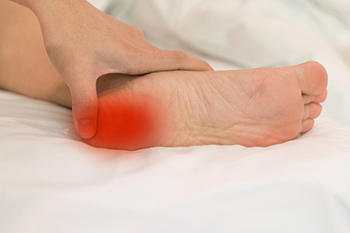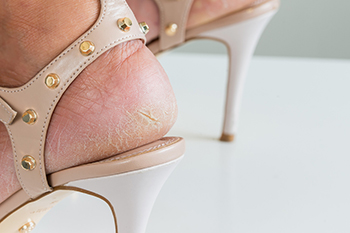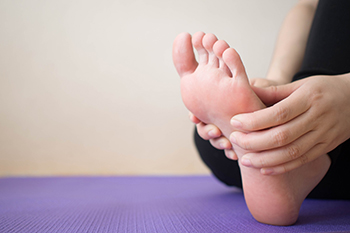Items filtered by date: July 2023
Do Your Child's Feet Hurt?
Reasons for Heel Pain

Heel pain is a common foot condition and can be caused by various reasons. Plantar fasciitis is the most common reason patients may have heel pain, followed by Achilles tendonitis and arthritis. When heel pain occurs in physically active children and young adults, it may indicate that Sever’s disease has developed. Heel pain often comes from overuse, or from wearing shoes that do not fit correctly. Additionally, there may be existing medical conditions that can lead to experiencing heel pain, such as flat feet or obesity. A stress fracture of the heel bone will often lead to heel pain, or it can come from osteomyelitis, which is a heel bone infection. Heel pain may be prevented by gently stretching the heel before engaging in running and jumping activities. If you have heel pain, it is strongly suggested that you are under the care of a podiatrist who can determine what the cause is, and offer correct treatment options.
Many people suffer from bouts of heel pain. For more information, contact Jon McCreary, DPM of Fort Worth Podiatry. Our doctor can provide the care you need to keep you pain-free and on your feet.
Causes of Heel Pain
Heel pain is often associated with plantar fasciitis. The plantar fascia is a band of tissues that extends along the bottom of the foot. A rip or tear in this ligament can cause inflammation of the tissue.
Achilles tendonitis is another cause of heel pain. Inflammation of the Achilles tendon will cause pain from fractures and muscle tearing. Lack of flexibility is also another symptom.
Heel spurs are another cause of pain. When the tissues of the plantar fascia undergo a great deal of stress, it can lead to ligament separation from the heel bone, causing heel spurs.
Why Might Heel Pain Occur?
- Wearing ill-fitting shoes
- Wearing non-supportive shoes
- Weight change
- Excessive running
Treatments
Heel pain should be treated as soon as possible for immediate results. Keeping your feet in a stress-free environment will help. If you suffer from Achilles tendonitis or plantar fasciitis, applying ice will reduce the swelling. Stretching before an exercise like running will help the muscles. Using all these tips will help make heel pain a condition of the past.
If you have any questions please contact our office located in Fort Worth, TX . We offer the newest diagnostic and treatment technologies for all your foot and ankle needs.
Caring for Dry, Cracked Heels

The heels of the feet can become cracked from severe dryness. This can happen from cold, dry weather, walking barefoot, or hot showers. Diabetics can be prone to cracked heels because their illness decreases the natural oils in the feet. Cracked heels can itch, cause pain, and be unsightly. If not tended to, the cracks can turn into fissures, which can bleed and are prone to infection. Tips for preventing and treating this condition include adequate hydration, short baths and showers with water that is not too hot, use of gentle, fragrance-free soaps so feet can retain more of their natural oils, and frequent moisturizing of the feet. Petroleum jelly can be applied to the heels before bed, and socks can be worn to protect bed sheets, as well as to further moisturize the feet. Wearing closed shoes and socks that fit well can help protect against cracked heels. If you have cracked heels that are not responding to home care or if the cracks are worsening or appear infected, it is suggested that you visit a podiatrist for more effective treatment and restoration of the heels to their smooth, healthy state.
If the skin on your feet starts to crack, you may want to see a podiatrist to find treatment. If you have any concerns, contact Jon McCreary, DPM from Fort Worth Podiatry. Our doctor can provide the care you need to keep you pain-free and on your feet.
Cracked Heels
It is important to moisturize your cracked heels in order to prevent pain, bleeding, and infection. The reason cracked heels form is because the skin on the foot is too dry to support the immense pressure placed on them. When the foot expands, the dry skin on the foot begins to split.
Ways to Help Heal Them
- Invest in a good foot cream
- Try Using Petroleum Jelly
- Ease up on Soaps
- Drink Plenty of Water
Ways to Prevent Cracked Heels
- Moisturize After Showering
- Skip a Shower
- Keep Shower Water Lukewarm
- Don’t Scrub Your Feet
If you are unsure how to proceed in treating cracked heels, seek guidance from a podiatrist. Your doctor will help you with any questions or information you may need.
If you have any questions, please feel free to contact our office located in Fort Worth, TX . We offer the newest diagnostic and treatment technologies for all your foot care needs.
Causes of Tarsal Tunnel Syndrome

Tarsal tunnel syndrome is a condition that affects the feet. It gradually happens as a result of repetitive motion, causing the tibial nerve to become irritated or compressed. This is located inside the tarsal tunnel and is accompanied by ankle pain and discomfort. Additional symptoms can include a numbing or tingling sensation, and the overall foot may feel weak. People who have flat feet may be prone to developing tarsal tunnel syndrome, or it may occur in patients who have had a previous ankle injury. A lipoma, or mass, that lies near the tibial nerve may also cause tarsal tunnel syndrome. Having unexplained ankle pain may prompt an exam to be done which can properly diagnose tarsal tunnel syndrome. This can consist of having an MRI or Tinel’s test performed, both of which are accurate tests that can confirm this diagnosis. Treatment often begins with frequently elevating the foot, and relief may be found when an elastic compression bandage is worn for support. If you have ankle pain, it is strongly suggested that you confer with a podiatrist who can diagnose and treat tarsal tunnel syndrome.
Tarsal tunnel syndrome can be very uncomfortable to live with. If you are experiencing tarsal tunnel syndrome, contact Jon McCreary, DPM of Fort Worth Podiatry. Our doctor can provide the care you need to keep you pain-free and on your feet.
Tarsal Tunnel Syndrome
Tarsal tunnel syndrome, which can also be called tibial nerve dysfunction, is an uncommon condition of misfiring peripheral nerves in the foot. The tibial nerve is the peripheral nerve in the leg responsible for sensation and movement of the foot and calf muscles. In tarsal tunnel syndrome, the tibial nerve is damaged, causing problems with movement and feeling in the foot of the affected leg.
Common Cause of Tarsal Tunnel Syndrome
- Involves pressure or an injury, direct pressure on the tibial nerve for an extended period of time, sometimes caused by other body structures close by or near the knee.
- Diseases that damage nerves, including diabetes, may cause tarsal tunnel syndrome.
- At times, tarsal tunnel syndrome can appear without an obvious cause in some cases.
The Effects of Tarsal Tunnel Syndrome
- Different sensations, an afflicted person may experience pain, tingling, burning or other unusual sensations in the foot of the affected leg.
- The foot muscles, toes and ankle become weaker, and curling your toes or flexing your foot can become difficult.
- If condition worsens, infections and ulcers may develop on the foot that is experiencing the syndrome.
A physical exam of the leg can help identify the presence of tarsal tunnel syndrome. Medical tests, such as a nerve biopsy, are also used to diagnose the condition. Patients may receive physical therapy and prescriptive medication. In extreme cases, some may require surgery.
If you have any questions please feel free to contact our office located in Fort Worth, TX . We offer the newest diagnostic and treatment technologies for all your foot and ankle needs.
Consequences of Wearing High Heels

Many women have foot pain while wearing high heels, or soon after they are taken off. Falling episodes may be increased, and research has shown wearing this type of shoe can be a leading cause of foot problems among women. Hammertoe is a foot deformity that causes the second and third toes to bend at the middle joint and point downward. This can be a result of having inadequate room for the toes to move freely in. Many high-heeled shoes have pointed toes, providing less than ample room at the top of the shoe. A condition known as Morton’s neuroma can develop if the nerve between the third and fourth toes becomes compressed or irritated. It can also occur from the minimum room for the toes. Studies have shown the calf muscles may be affected when high heels are frequently worn, which may lead to chronic heel pain. If you would like more information about the possible dangers of wearing high heels, it is suggested that you speak with a podiatrist who can address any concerns you may have.
High heels have a history of causing foot and ankle problems. If you have any concerns about your feet or ankles, contact Jon McCreary, DPM from Fort Worth Podiatry. Our doctor can provide the care you need to keep you pain-free and on your feet.
Effects of High Heels on the Feet
High heels are popular shoes among women because of their many styles and societal appeal. Despite this, high heels can still cause many health problems if worn too frequently.
Which Parts of My Body Will Be Affected by High Heels?
- Ankle Joints
- Achilles Tendon – May shorten and stiffen with prolonged wear
- Balls of the Feet
- Knees – Heels cause the knees to bend constantly, creating stress on them
- Back – They decrease the spine’s ability to absorb shock, which may lead to back pain. The vertebrae of the lower back may compress.
What Kinds of Foot Problems Can Develop from Wearing High Heels?
- Corns
- Calluses
- Hammertoe
- Bunions
- Morton’s Neuroma
- Plantar Fasciitis
How Can I Still Wear High Heels and Maintain Foot Health?
If you want to wear high heeled shoes, make sure that you are not wearing them every day, as this will help prevent long term physical problems. Try wearing thicker heels as opposed to stilettos to distribute weight more evenly across the feet. Always make sure you are wearing the proper shoes for the right occasion, such as sneakers for exercising. If you walk to work, try carrying your heels with you and changing into them once you arrive at work. Adding inserts to your heels can help cushion your feet and absorb shock. Full foot inserts or metatarsal pads are available.
If you have any questions please feel free to contact our office located in Fort Worth, TX . We offer the newest diagnostic and treatment technologies for all your foot and ankle needs.

